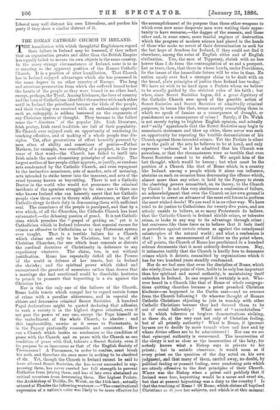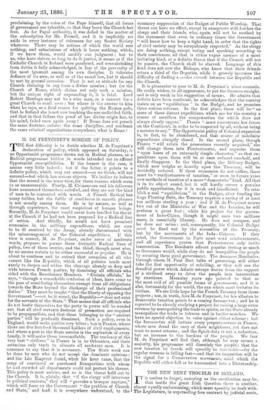THE ROMAN CATHOLIC CHURCH IN IRELAND.
MAE humiliation with which thoughtful Englishmen regard their failure in Ireland may be lessened, if they reflect that an organisation greater and older than the British Empire has equally failed to secure its own objects in the same country. In the many strange circumstances of Ireland, none is to us so amazing as the apparent position of the Roman Catholic Church. It is a position of utter humiliation. That Church has in Ireland enjoyed advantages which she has possessed in the same degree in no other country of Europe. The long and atrocious persecution from which she suffered bound to her the hearts of the people as they were bound in no other land, except, perhaps, the Tyrol. Among Irishmen, the love of country and the love of Catholicism identified themselves with each other until in Ireland the priesthood became the idols of the people, and their teaching was received with an enthusiastic approval such as, unhappily, is seldom bestowed on the exponents of any Christian system of thought. They became in the fullest sense the " directors " of the popular life. Irish literature, Irish poetry, Irish rural tradition, are full of their popularity. No Church ever enjoyed such an opportunity of rendering its teaching effective, and of making of a whole people true dis- ciples. Yet, after generations of effort honestly pursued by men often of ability and sometimes of genius—Father Mathew, for example, was something of a prophet, in the true sense of that word—the Church has failed to instil into Irish minds the most elementary principles of morality. The largest section of her people either approve, or justify, or condone acts condemned by the Catholic Church, and even repugnant to the instinctive conscience, acts of murder, acts of maiming, acts intended to strike terror into the innocent, and acts of the cruel tyranny known as boycotting. There is not a Catholic Doctor in the world -who would not pronounce the criminal incidents of the agrarian struggle to be sins ; nor is there one who knows Ireland who can honestly assert that her Catholic people view them even in theory with abhorrence, or that the Catholic clergy do their duty in denouncing them with sufficient seal. The conscience of the people is paralysed, and that by a vice which, of all the Churches, the Catholic Church has least extenuated,—the debasing passion of greed. It is not Catholi- cism which preaches the " gospel of getting on," yet it is Catholicism which in Ireland tolerates that especial excuse for crimes as offensive to Catholicism as to any Protestant system -ever taught. That is a terrible failure for a Church which claims not only to be Christian, but to be, of all Christian Churches, the one which least conceals or distorts the cardinal doctrines of Christianity in deference to any expediency whatever. The claim, too, is not without justification. Rome has repeatedly defied all the Powers of the world in defence of her tenets, but in Ireland she shrinks ; and the spiritual power which risked and encountered the greatest of secessions rather than decree that a marriage she had sanctioned could be dissoluble, hesitates to preach to peasants that boycotting is a sin against the Christian law.
Nor is this the only one of the failures of the Church. Rome holds tenets which compel her to regard certain forms of crime with a peculiar abhorrence, and in especial she abhors and denounces criminal Secret Societies. A hundred Papal declarations might be quoted declaring that adhesion to such a society is in the highest degree criminal, even if not past the power of any one, except the Pope himself as the embodiment of the whole Church, to absolve ; and this implacability, unwise as it seems to Protestants, is in the Papacy profoundly reasonable and consistent. How can a Church which insists on confession as the condition of peace with the Church. and on peace with the Church as one condition of peace with God, tolerate a Secret Society, even if its purpose be as innocuous as that of the English Society of Freemasons? A'-Freemason, in order to confess, must break his oath, and therefore sin once more in seeking to be absolved of sin. Yet, though the Church in Ireland cannot be said to have allowed Secret Societies, she has never succeeded in sup- pressing them, has never exerted her full strength• to prevent Catholics from joining them, and has of late even abstained on critical occasions from denouncing them. Her highest Prelate, -the Archbishop of Dublin, Dr. Walsh, on the 14th inet., actually -tittered at Pinnies the following sentence :—"The -constitutional -expression of a nation's voice was likely to be more eifectivefor
the accomplishment of its purpose than those other weapons to which even now some desperate men were waiting their oppor- tunity to have recourse,—the dagger of the assassin, and those other and, in some sense, more fearful engines of destruction which the progress of modern science had placed in the hands of those who make no secret of their determination to seek for the last hope of freedom for Ireland, if they could not find it elsewhere, among the ruins of English cities and of English civilisation. You, the men of Tipperary, shrink with no less horror than I do from the contemplation of so sad a prospect. Let us trust, then, that those in whose hands, under Providence, lie the issues of the immediate future will be wise in time. No nation surely ever had a stronger claim to be dealt with on the broad, plain principles of justice than Ireland has to-day." We have no wish to be hard upon a Prelate whom we believe to be usually guided by the strictest rules of his faith ; but when, since Secret Societies began, did a great dignitary of the Catholic Church ever speak of the possible action of Secret Societies, and Secret Societies of admittedly criminal purposes, in terms like that, terms exactly resembling those in which we speak of famine as a consequence of drought, or punishment as a consequence of crime ? Surely, if Dr. Walsh is not merely trying to frighten English opinion, and actually and "sadly" apprehends that the Secret Societies may begin to assassinate statesmen and blow up cities, there never was such an opportunity for repeating the terrible denunciations of his Church against those intended crimes. Yet the Prelate is silent as to the guilt of the acts he believes to be at hand, and only expresses "sadness," as if he admitted that his Church was powerless, or that the circumstances were so terrible that even Secret Societies ceased to be sinful. We acquit him of the last thought, which would be heresy ; but what must be the position of a Church like that of Rome which, in a country like Ireland, among a people which it alone can influence, abstains on such an occasion from denouncing the offence which, almost more than any other, is held by the Papacy to strain the absolving powers committed, on its theory, to the Church by Christ ? Is not this very abstinence a confession of failure, an acknowledgment that even the Church on her own ground is powerless to arrest an advance of the most evil forces to perform the most wicked deeds ? We can read it in no other way. We have tried to do justice to Catholicism for twenty-five years, and are utterly unable to believe, as so many Protestants do believe, that the Catholic Church in Ireland shields crime, or tolerates crime, or looks in any way to its advantage through crime ; but sentences like these force us to believe that it feels itself as powerless against certain crimes as against the cataclysmal catastrophes of the natural world ; and what a confession is that ! It is an announcement of failure on the point where, of all points, the Church of Rome has proclaimed in a hundred solemn documents that it most ardently desires success. Nay, it intimates tacitly that the Church is hardly free to denounce crimes which it detests, committed by organisations which it has for two hundred years steadily condemned.
Nor do we feel sure that even the discipline of Rome, which she wisely,from her point of view, holds to be only less important than her spiritual and moral authority, is maintaining itself unbroken in Ireland. In one respect it certainly is not. Who- ever heard in a Church like that of Rome of whole congrega- tions quitting churches because a priest preached Christian kindness—as happened in the Curtin case—and no censure from the Church following ? Or whoever thought of Roman Catholic Christians objecting to join in worship with other Catholic Christians because they had decreed them to be out of social fellowship ? What sort of " sacerdotalism" is it which tolerates or forgives demonstrations striking, as these do, at the very root not only of Christian feeling, but of all priestly authority ? What is Rome, if ignorant laymen are to decide by mere tumult when and how and by whom divine offices are to be administered ? Nor can we see that episcopal authority is reverenced. The insurrection of the clergy is not so clear as the insurrection of the laity, for nobody knows what a Bishop says in private to his priests ; but to outside observers, it would seem as if every priest on the question of the day acted on his own judgment, and that many of them, carried away, no ,doubt, by political feeling or peasant feeling, were condoning acts which are utterly offensive to the first principles of their Church. Where was the Bishop -when a priest said publicly that if Ireland were free, boycotting would be a mean and cruel sin, but that at present boycotting was a daty to the country I Is - that the teaching of Rome ? Of Rome, which claimaall baptised Christians as de jure her subjects, and which is at this moment
proclaiming, by the voice of the Pope himself, that all forms of government are tolerable, so that they leave the Church but free. As for Papal authority, it was defied in the matter of the subscription for Mr. Parnell, and it is implicitly set aside in every instance of tolerance for any Secret Society whatever. There may be actions of which the world sees nothing, and submissions of which it hears nothing, which, if we knew them, would modify our judgment ; but to us, who have striven so long to do it justice, it seems as if the Catholic Church in Ireland were paralysed, and were shrinking from duties it fully acknowledged, in fear of the perversity of the most ignorant among its own disciples. It tolerates defiance of its own, as well as of the moral law, lest it should be met by general secession. That is not an attitude for any Church claiming in any form a divine mission ; but for the Church of Rome, which claims not only such a mission, but the unique right of expounding it, it is fatal. Lord Robert Montagu may not be a wise man, or a convert for a great Church to exult over but where is the answer to him when he says, as a final reason for quitting the Roman pale, that in Ireland she is not now teaching the one undivided faith, and that in that failure the proof of her divine origin has, to his mind, faded once again away ? If Rome does not preach the same doctrine, enforce the same discipline, and condemn the same criminal organisations everywhere, what is Rome ?



































 Previous page
Previous page